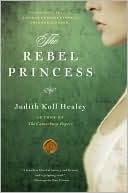| Another
Review at MyShelf.Com | ||||||||||||||
|
By Judith Koll Healey I love stories that take place in the Middle Ages and, among those, the ones close in time to Henry Plantagenet and Eleanor of Aquitaine are my favorite. The Rebel Princess falls in this category. As a child, Princess Alais, daughter of the king of France, is betrothed to Richard, son of Henry and Eleanor. She grows up with her husband-to-be and his siblings, but the marriage never happens. Instead Henry takes her to his bed and a son is born. Alais is told the baby is dead. But, years later, she learns the boy is very much alive and a clerk to Sir William, the Templar Master of England. In The Canterbury Papers, the previous book of what it seems will be a trilogy, Alais meets her son, Francis, and becomes William's lover. Now years later, Alais is back in France, at the court of her half-brother King Philippe, while she waits for William to get the Pope's dispensation so they can get married. In the Fall of 1207, William comes to court. He is still at the Pope's service and still insists that Alais does not tell Francis who his parents are. The time is not right, he tells her, the South of France is on the brink of war as the Pope wants to put an end to the Cathar heresy and is asking King Philippe for men and money to do so. At the council with the Pope's legates, King Philippe refuses his help to fight the South lords that protect the Cathars. That very night, one of the Pope’s legates kidnaps Francis thinking the boy knows where to find the golden chalice that has disappeared from the Abbey. A chalice the legate wants for its monetary value, while the Cathars revere it for its connection to Saint John. Alais, ignoring William's orders to stay in Paris, rides South in search of her son, with the help of her visions and a map left behind in Francis's room, whether by friend or foe she doesn't know. Reunited with old friends as she makes new ones, Alais will risk everything, even her relationship with William, to find her son. Although there are several holes in the plot (the chalice, for instance, seems more an excuse than intrinsic to the story), and the pace is slow at times, I enjoyed the author's reconstruction of a world so different from our own, even if the characters' actions and motivations are not. I will be reading the next book on this series.
|
|
|||||||||||||
©
2010 MyShelf.com |
||||||||||||||
 The Rebel Princess
The Rebel Princess